Here is a survey about YOUR future when you get older: How do you see the second half of life?
Please go to https://de.surveymonkey.com/r/8NZQ3XV
OUR FIRST COMMUNITY LIVE CONVERSATION – about AGEING
Hear our presentation at the INTEGRAL EUROPEAN CONFERENCE in Hungary,
May 6th, 2016
We were pleased and grateful to witness a lively interest in the topic.
You are invited to join the discussion by filling in the survey above and by joining our Facebook Group http://bit.ly/integralageing
Hear our pre-conference talk about what we will be talking about on May 6th, 2016 in Siofok/Hungary.
Ageing with elegance and grace

SEASON 6 EPISODE 7
November 13th 2019
Ageing with Elegance and Grace – with Raquel Torrent
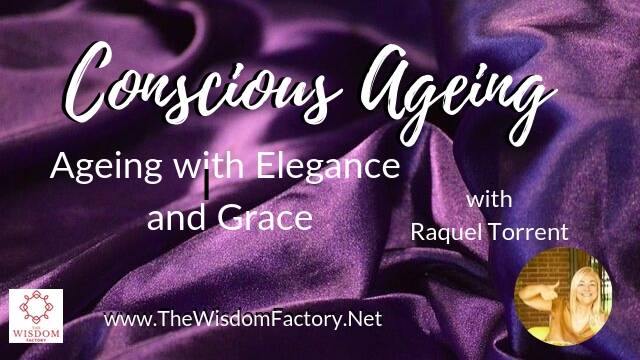
HEIDI´S INTRO
What counts in our society is youth, effectiveness, speed and making it all. We teach our children a lot of – ultimately – useless stuff. They are filling their heads and they try to keep up with the expectations, and we fail to teach them the true value of life itself. We even don’t realise how much being in balance is important for our own health and wellbeing. We are too much absorbed in doing things which seem to be important and urgent. Most of the times they are not and we are wasting our life time on what others find we should do.
For a long time we know that our brain has two parts and that one is more active when we learn and are engaged in mental processes, while the other is creative, agile and open and adds the juice to our lives. Unfortunately this is seldom heard and followed by mainstream education. Music and arts are still considered as a more or less useless extra which we can cancel from the curriculum without problems. Really?
In my opinion it is not by chance that depression has become a huge issue in our societies. We have cut out the nurturing elements, our brain has become lopsided, we have lost balance. When we approach the third act of our lives, such a situation is not helpful for enjoying the years which are given to us thanks to modern medicine and technical progress. We ignore the power of our mind, the power of beauty to enhance our energy level – very much to our detriment.
With spiritual practice of any kind we have the chance to lift ourselves up, to see the beauty around us, to create beauty in ourselves and in what we do, and we allow grace to enter into our lives.
We have the power to choose how we want to live: depressed or joyful. We might need the help of others to keep us up, and when we watch out, we can find this support everywhere.
Our guest Raquel Torrent has chosen to live the life of beauty, elegance and grace. In our conversation she expresses herself in this way and we hope to inspire you to do alike!
ABOUT RAQUEL TORRENT
Raquel has been called the “midwife of the Spirit” by many people, who, over the years, have benefited from her Psychotherapy consultations, Coaching sessions or Workshops, Articles, and Annual Seminars. She is more than just an outstanding integral psychologist in four languages, she is a spiritual teacher, mentor, and guide for individuals and groups who are ready to take the next steps in their personal development and evolution to enjoy a valuable life.

0:00 Intro Heidi – The Feminine in Integral
0:50 “Ageing with elegance and grace”, Raquel introduces herself: looking back – recognition of grace. Education and further studies. Psychology and spirituality. In research of the wisdom of the soul.
4:00 Behaviorist teachings > humanistic>humanistic> integral psychology
6:00 Getting older is a journey – getting older makes us more quiet, not necessaily at the outside, but inside. Maintaining the inner peace. Letting things be. Inner elegancy, also showing outside.
10:30 Resting attitude when there is no need for action. Trying to see the bigger picture. Believing in grace = arrive in the consciousness of living in an energetic world of everything there is. Connected with something bigger than me, as well as myself.
14:45 Sensing in what is the right thing to do, knowing yourself deeply. CAn be learned by “elegantly resting”, laying back (inside of us) and act from there.
17:30 Older people are not superfluous, but serve for something! Letting the space to the younger generation, but be here as an energetic backup, holding the space for them.
20:30 The clue is Forgiveness. Letting go of resentments. Cleaning up with the blocking energies.
22:00 What to do to arrive at these insights of ageing with grace? Daily practice. Forgiveness. Re-sent-ment = feel over and over again a lie. Recognising the lie: the process. Seeing the reality of the person and looking for the love in me. Keeping the energy flowing.
30:00 Handling emotions: recognise the hurt and the negative charge. I can change the polarity. Negative emotions crystallize and create physical problems. Transmuting the polarity of the energy.
35:30 3 types of medicine. Physical, psychological, energetic. Feeling ill in older age: you can do something, (energy work). Recognition of the lack of balance: > stop! >Start connecting with breath > reconnect with life. 40:25 Looking for the root cause. An example: Raquel’s experience in the voice contest. The information of her body. Asking the pain: when did it start? What is the symptom telling me? >>energetic consciousness of how to cope with the situation.
48:00 Heidi’s story of the day before leaving for Italy.
49:50 The need of discernment: Is it in alignment with what I really want. The call of the soul.
53:05 FInd something to have fun and find out what your possibilities are. Do things just for the experience, not for career or money reasons! Step out of the comfort zone. We need a challenge to keep staying alive.
55:00 Don’t just do nothing, but resting doesn’t mean to do anything, but to step up and do, while maintaining the inner rest. Elegance and Grace: be it ease with oneself, wherever we are. Have a presence which is nice to be around. Don’t become negative, grumpy or blaming!
CLICK ON THE LINKS BELOW FOR THE BOOKS RECOMMENDED
Karen Voorhees

SEASON 6 EPISODE 9
November 6th 2019
Death doesn’t exist – with Karen Voorhees

HEIDI´S INTRO
We all, everyone of us, has the experience that someone in their family or community died. So how can we dare to say that death doesn’t exist? People die and then they are gone, we don’t see them around us any more and no-one ever came back. That’s what we are taught to think inside our predominant materialist worldview. But what if it is wrong?
What does “death” mean, and what does “life” mean? Is it possible that our life continues in some way even when we have done our last breath and our body is buried? All spiritual traditions talk about eternal life or some continuum after the physical death. People who were dead and then brought back into life report about their death experience – or near death experience, depending how death is defined. So what shall we believe?
Science defines death for its purposes – to recover organs for transplantation the body is declared “dead” despite a beating heart, which not long ago was considered a sign of being alive. The body, once “really” dead is declaring the absolute end of a person’s life. This is the logical consequence of a worldview which recognises one body alone, the physical, and ignore all the others which are known for thousands of years and studied by many spiritual traditions.
Ken Wilber talks about the “right quadrants absolutism”. People who can see the world only from the outside perspective deny interiority because it is not measurable with materialist measurement systems. The quick conclusion: what we cannot measure doesn’t exist – despite the experience of millions and millions of people shows clearly that the immeasurable internal dimension exist and is very important for our wellbeing and balance in life.
So why can we say that death doesn’t exist? If we believe in an afterlife, in re-incarnation, in the existence of a transcendent soul which last even if the body has died, life, or better “existence” continues. It just transcends into a different form. Science denies this possibility, but it cannot prove that it doesn’t exist. Does that really mean that we are wrong in believing? Or does it just mean that science believes as well, only the opposite idea? Only because the scientific method of exteriors doesn’t work on the interiors, there is no justification to doubt the phenomena, but merely to change the scientific tools for the inquiry.
In our conversation, Karen Voorhees develops her ideas from her background in spiritual practice, using the integral model for her considerations. We also shared some stories about life and death and how we, personally, deal with the question. It was a rich and fruitful conversation on a topic which so many of us try to avoid – which is not a good idea, as seen in an example given by Karen.
ABOUT KAREN VOORHEES
More info on this page
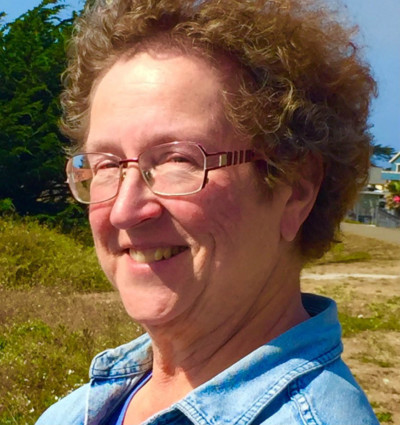
0:00 Heidi’s intro
0:30 Karen introduces herself – After Phd her interest went to Spirituality, spiritual literature of the world, experience in
meditation and accompanying dying people.
2:50 What does “death” mean?
3:40 Several layers. Heidi talks about her experiences with death, especially Mark. Can “normal” science proof my intuition wrong? I cannot proof my experience right. Until 1800s Humans are souls incarnated intio a body, then the shift into: humans are bodies with a soul
6:00 The 4 Quadrants of Ken Wilber: Impossibility to proof the content of one with the tools of the other.
6:55 Karen is a fan of materialism for what it achieved, but doesn’t agree that it is the only thing.
7:30 The basic axioms in science are not questions. Even it the method is right, when the primary assumption is wrong, good science doesn’t make it right.
8:25 Different science: Robert Shaldrake. Heidi’s experience with telepathy. Normal science: “it doesn’t exist because it cannot exist”
10:02 Karen about Calr Jung on Videos: the deep psyche believes in death of physical body, but not as personality, spirit, consciousness. Examples told by Karen. The passage is “all automated” = relief for a materialist.
15:40 Deeper levels than personality, deeper self doesn’t die. What we say are concepts, a mental map, not the territory.
16:50 Theory of Kharma which shapes our lives. The seed which we build further with free will. – Who choses? Which “you” do we talk about?
18:00 Wilber: there are many levels of “you”. Developmental levels.
19:18 The soul chooses the earthly parents?
20:40 Karen’s teacher’s story of manifestation. “Who wants to go out and have an adventure?” Souls never in manifestation dance in glorry, as well as those who come back in the true home, they dance even better
23:50 A poem by Rilke.
25:37 A parallel to this world: gratefulness for your good life when you know what you have – would be the right attitude.
27:25 What spirituality did for Karen: opened her eyes and heart without heroic inflation.
29:10 Learning about humans, the believe that there is a reason for my existence. Heidi shares her experience with magic mushrooms: the universal grieving process.
32: Mark is dead, but he is not dead. Come into my energy again, let go of fear and doubt. The message: there is much more than normal consciousness.
34:25 The essence of the grief: existential desperation, for mistreating each other in the world, and the fact that we come and go, and it doesn’t matter, as we are still here in some way. Feel the connection with the Universe.
36:50 The reason for the material Universe: we need a challenge to go on. God wanted an adventure.
38:00 a story: question to her guru: why did God create this manifestation of suffering? – This is usually the question we ask God when we meet him on the 5th dimension – Karen wanted a “real” answer. She was taken out of her body. All has something to do with “love”. Confidence that there is something so much bigger than our bodies and personalities out there.
43:25 A parallel to dreams? Are dreams metaphors for the transitioning of life? Bodies are like our automobile.
45:30 Subtle bodies. 8 dimensions. Dream bodies are more real than physical, We exist in all dimensions in all time, but our personal consciousness is limited by our physical possibilities to perceive. Dead is like not using the car any more, but still have the other bodies.
48:50 So she was able to be pressent when most other people wouldn’t have been: 6 months of constant whining before death of the mother in law.
50:00 Stay with difficult experience is part of human growth.
CLICK ON THE LINKS BELOW FOR THE BOOKS RECOMMENDED
Spiraling down to Beige: Loraine Laubscher

SEASON 6 EPISODE 7
October 30th 2019
Ageing: Spiraling down to beige? with Loraine Laubscher
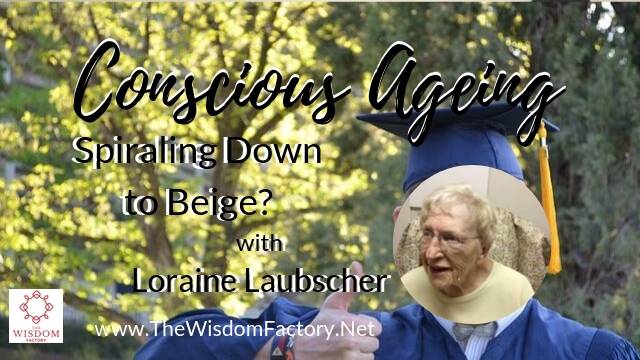
HEIDI´S INTRO
When we are born, we start out in Beige, the first level of development in Spiral Dynamics which is characterised by the need for safety and security, for food and shelter, for survival. This is the stage where the infant needs constant help with almost everything. Then we grow up, through other stages, hopefully, and then? When we face old age we fear to turn back into beige, to a situation where we need help for almost everything, again. We fear that this might happen to us and this could be one of the main reasons why we try to ignore our getting older as long as possible.
The fear is huge to, one day, not being able anymore to be auto sufficient, and to “lose our minds” with Alzheimer disease. It takes a leap of courage to consciously prepare for that time in which we won’t be able to live the same way as we were used to. Not only that, but we need to consciously work on keeping our physical and mental abilities alive as long as possible.
But how?
First of all, we need to explore ourselves, get to know our strengths and weaknesses and train our will. Thus we will do our physical exercises, eat healthier food and take our supplements, even when we are tempted to just relax and do nothing. iI is, maybe, even more important to find new meaning in our lives, which gives us the direction, even if we have to face unpleasant periods. If the body isn’t working like before, we still can do what it is able to do, even improve our mobility by constant training. And it is mandatory to train our mind for not giving in to despair, but instead enabling us to find something exciting.
Al contrary to our common ideas, we can learn new things, always. Epigenetics teaches us that the brain can create new pathways. But they need to be trained, constantly, to stay alive. When we are mentally active, also the body benefits. So in CONSCIOUS AGEING, the crucial advice of our guests is: don’t give in to the desire of rest – you can rest enough after death! – but keep staying active. Find meaningful tasks which challenge you enough to keep your mind functioning and even increasing its capacities of making new connections, getting new insights, seeing the bigger picture; in short, gaining WISDOM.
Not everyone will write their Phd in their 80ies, as our guest Loraine Laubscher did. But studying, learning new things and producing the seed to benefit those who come after us: everyone can set this goal and walk the path towards its fulfilment.
ABOUT LORAINE LAUBSCHER
Please go to the page of our first conversation HERE.
You will find her Bio and a long list of her publications and participations at conferences there.
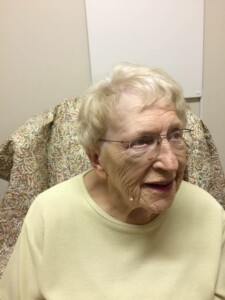
0:00 Loraine on the topic
0:17 Heidi intro to Loraine. The previous conversation with here HERE
1:30 Loraine goes back to Jung and the collective unconscious. We are starting from birth, beige. ALL stages have positive AND negative, but “lower levels” should not be looked down from people who believe themselves in “higher levels”.
3:00 Examples of older people in beige in an old peoples’ home.
4:50 The work in life on the physical or/and soul point of view. Only physical can lead to problems with mental presence. Smiling on those people, rituals are important, the power of music.
7:30 The comparison with a baby. African dancing, the rhythm in us.
8:10 About the Bushmen, nomades are in beige. It is not about blood relaionship, just about working together. Bushmen had 26 senses, we have 5-8! They were very capable in many things! Hunting ritual.
11:10 We need to look where we came from! Looking back on how people survived in 20 century: Lessons to be learned! Transferring information in the collective unconsciousness!
12:50 Sangomas can tap into the collective unconscious.
13:25 Loraine is still practicing for old age. Completing things in this life. Adjustments in another lifetime?
14:20 Value systems are living systems, we need to live them.
15:00 About Clare Graves and beige people around her, a story of addiction and more. Positive an d negative expression of beige.
17:20 How do people transition? People die in the retirement center. It is part of life!! The example of nature.
18:45 Conscious Ageing is about sowing good seeds. The story of Noah and the arch: disasters connected with water. When it happens, we don’t know. Important what we are doing today.
21:17 Heidi talks about what she heard. End of this life is not the end? Heidi’d experience with the capacities of Sargomas. The akashic field.
23:28 Lorqaine speaks about 2 previous lives. Was it a dream? Everyone needs to go their own path! An example of a lady who was in a car accident how, in shock, she passed through the levels until beige and back again. The movement from one system/level to the other. In the living system you can move down and up according to the circumstances.
A sort of consciousness is present. Addicts and bi.polars often don’t want to be helped.
29:30 Loraine is ageing consciously, she is tempted to go further .
30:00 Heidi’s appreciation: openness to life.
31:10 Age is just a number – like when you go to the hospital..
32 we don’t know when we die and what we need to deal with.
32:50 A inspirational reminder to people I AM HERE NOW. LIFE IS FUN!
33:35 When do we think to be OLD? – “Still doing”.
34:20 Loraine thought to not get older than 30 and prepared for that
34:45 Preparing for death is important, also from the practical perspective. Doing something in life which is meaningful
36:00 Loraine about Astro travelling. Searching will lead you to experience. Getting on different trains.
The previous conversation with here HERE
Related Videos
CLICK ON THE LINKS BELOW FOR THE BOOKS RECOMMENDED
Sue Brightman: a call to further becoming

SEASON 6 EPISODE 7
October 23rd 2019
Ageing – A call to further becoming with Sue Brightman
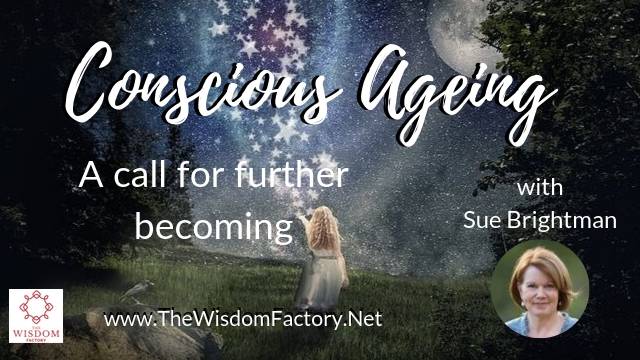
HEIDI´S INTRO
How do you feel when someone asks you: Are you retired? Maybe the question is fine for you, you are happy to say “yes” and glad to, finally, not having to go back to work next Monday. Maybe you were tired of your work and now, being re-tired, you can rest from your life’s work.
Maybe you don’t want to be asked this question, maybe it sounds strange to you. Maybe you connect with this word the notion of “too old for work”, “useless for society”, “you need to step down and give way to the young”, and you might not really believe these ideas. Then you are in good company with many of us, especially the 100 women whom our guest Sue Brightman has interviewed. They made clear that “further becoming” is a better word for the time after you have left the work phase in your life.
Instead of indulging in re-tiredness, many of us in the “second adulthood” are expanding and exploring new territory thanks to the new possibilities which arise by not growing children or doing the normal job any more. It is a time of harvesting a long life’s experiences and to offer them back to the world in one way or another!
About Sue Brightman
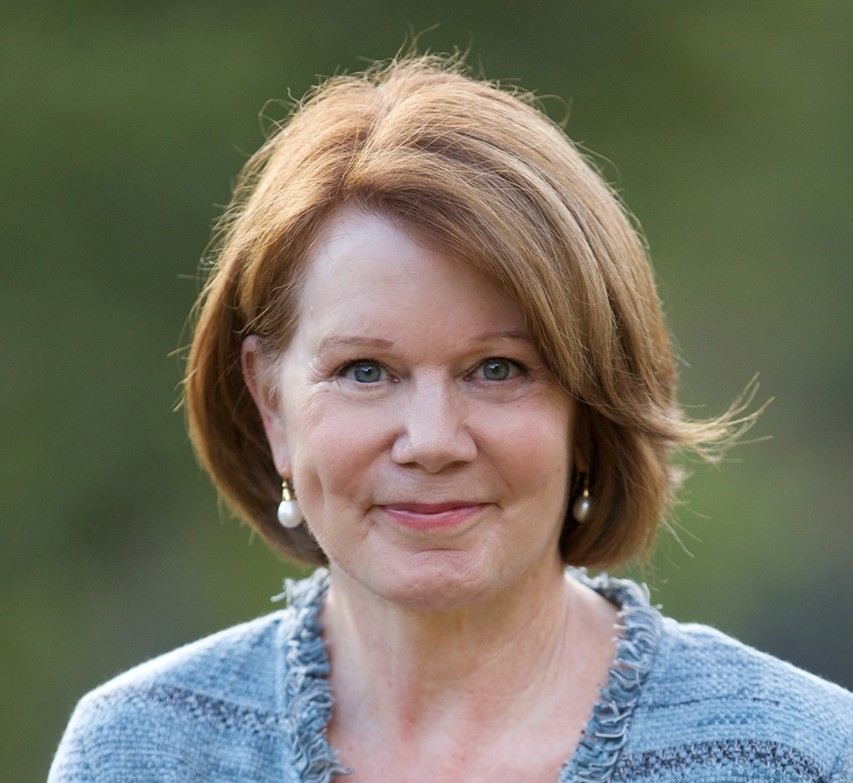 For 30 years, Sue worked as an Organizational Development and Leadership Consultant, teaching and coaching at some of the world largest organizations. A Master Trainer and Certified Coach in Conscious Business, Sue founded Brightman Glover International and facilitated programs to clients in over 40 countries including Shell Oil, General Motors, Pulitzer Newspapers, Abbott Pharmaceuticals, and Huffington Post.
For 30 years, Sue worked as an Organizational Development and Leadership Consultant, teaching and coaching at some of the world largest organizations. A Master Trainer and Certified Coach in Conscious Business, Sue founded Brightman Glover International and facilitated programs to clients in over 40 countries including Shell Oil, General Motors, Pulitzer Newspapers, Abbott Pharmaceuticals, and Huffington Post.
Like many women in her subsequent research, Sue recognized natural completeness of her career in her late 50s. Recognizing what she now calls “Done With That nudges”, she also recognized a full-on zest for wanting to continue learning, growing, and contributing.
Sue’s consideration of the question “What now?” was accompanied by deep curiosity about this stage of life: natural completion of successful careers, but more still to do with energy, creativity, good health, and spunk. She discerned a new pattern emerging on a global scale along these lines. That’s when she found social anthropologist Mary Catherine Bateson’s work who declares that a whole new stage of life has arrived between 50-70+: Those of us in it are pioneering what it means, says Bateson.
In 2016, Sue launched a research project to interview 100 women between 50-79 to listen for markers of this new stage, and capture the tracks we’re laying down for ourselves and generations to come.
Sue’s upcoming book A Call to Further Becoming: The New Declaration from Women Over 50 announces ten themes that emerged repeatedly from 100 women’s stories and responses. Not only do they include the plethora of creative endeavors we are embarking on at this time – but they blow out of the water the old narrative of retirement, disengagement, and decline. Relationships of deeper connection, respect for our own resilience borne of facing challenges, and a growing trust in our inner wisdom allow us to speak with courage, act without fear, and pursue what is ours to pursue.
These findings led to Sue founding For Women on the Journey of Their Lives, LLC through which she supports women in their 50s, 60s, 70s through Executive/Life Coaching, Women’s “Further Becoming” Retreats, and soon-to-be-offered online Workshops/Groups. Combined with her certification as an SQ21 spiritual intelligence coach and interfaith chaplain, Sue’s championing of women who are pioneering Adulthood II is already attracting university requests for teaching and speaking on this emerging topic.
CLICK ON THE LINKS BELOW FOR THE BOOKS RECOMMENDED
“The Third Act” with Edward Kelly

HEIDI´S INTRO
For many thousands of years people had a short life span. Only very few arrived at an old age, most people died before their 40ies birthday. Child mortality has diminished and life span increased steadily for the last couple of hundred years. Now, for the first time in history, “old age” begins about 20 years later than it used to start. Today you are not any more old with 60. You have the probability to live other 20 years in reasonable health and with enough life energy to start something new. The Third Act today is not the period before death as it used to be (this would now be the “fourth act”), it is a period of a redefined life – if we take it on as such.
Many of us over 60 are getting aware of this fact. We don’t feel old and we don’t want to be confined by the traditional expectations for people over 60. There is a difference between men and women. Men often struggle with retirement because their life suddenly loses the meaning which often was determined by what they did professionally. Women can seamlessly slip into grandmotherhood and find their meaning in taking care of the new generation. That has always been a choice for grandparents. But what if a woman decides that now, finally, she can do something different, develop her own interests instead of continuing to be in service of the family?
While society gives a lot of support for young people in their transition from the first to the second act of life, there is almost no support and encouragement for transitioning into the Third Act. Older people are not considered when looking for jobs. The work-world refuses to modify their standards and expectations which are tailored for people in their 30ies, maybe still 40ies. It doesn’t see the gift which older people bring to the table and it is not willing to adjust the modalities which would allow older people to fully take part in society and the occupational field.
Social change is slow and people who want to go ahead have to be pioneers for that change. They have to figure out by themselves how to create their life and find the meaning in their Third Act. Fortunately there are some generous people whose passion is to figure out these processes and to help others to go through them as well for not remaining alone in this very important quest of their lives. The question is only: will those people in need for help also take it? Or are they hesitant or even ashamed of needing support after having succeeded always alone in their previous life? Or is it the fear of being blamed by the family of not meeting the expectations of the younger ones when they dare to redefine themselves as an independent individual?
These are some of the questions I am discussing with Edward Kelly who, for many years, has offered his support to people in the transition period to the Third Act. His experience is that people are happy when they do the work and participate in his courses, but the main hurdle for them is, initially, to DECIDE to participate. It seems that very many people who could benefit from the inquiry into elderhood do not find the path to get the appropriate support they would need for growing into the fullness of their possibilities and of their being.
In our Conscious Ageing series we hope to encourage you to take this step. We have interviewed several people who actively offer their support in questions of getting older, finding one’s purpose, open oneself up instead of closing down, how to best take care for one’s health or even prepare for our death and for our legacy. Edward Kelly, the guest in this interview, has done theoretical and practical work in order to support the entry into the Third Act, he is certainly a perfect go-to person.
ABOUT DR. EDWARD KELLY
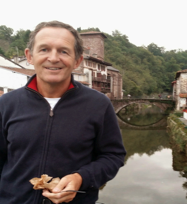 Edward Kelly is an entrepreneur, researcher and facilitator. In the past few years he has led over forty workshops in Intel, Accenture, Google, and others. He is a regular presenter on the MBA and Innovation programmes at University College Dublin (UCD) and has published articles on adult development in the ILR and JITP. More recently he has facilitated workshops, developed programmes and has run a conference on The new Third Act in life. He is currently writing a book on adult development and leadership. Prior to this, he ran a successful telecoms business which he founded in 1995 and before that organised and participated in ‘The Great London to Sydney Taxi Ride’ in 1988, which entered the Guinness Book of Records for the longest most expensive taxi ride in history. He holds an ITC, BA, MBA and PhD. He can be contacted at: edward@thethirdact.ie, on +353 86 810 2000 and at www.thethirdact.ie.
Edward Kelly is an entrepreneur, researcher and facilitator. In the past few years he has led over forty workshops in Intel, Accenture, Google, and others. He is a regular presenter on the MBA and Innovation programmes at University College Dublin (UCD) and has published articles on adult development in the ILR and JITP. More recently he has facilitated workshops, developed programmes and has run a conference on The new Third Act in life. He is currently writing a book on adult development and leadership. Prior to this, he ran a successful telecoms business which he founded in 1995 and before that organised and participated in ‘The Great London to Sydney Taxi Ride’ in 1988, which entered the Guinness Book of Records for the longest most expensive taxi ride in history. He holds an ITC, BA, MBA and PhD. He can be contacted at: edward@thethirdact.ie, on +353 86 810 2000 and at www.thethirdact.ie.
0:00 A short history of the series Conscious Ageing
1:40 Edward introduces himself and the idea of the Third Act. The impact of human longevity. Society is slowly dealing with that.
3:40 Example: Japan take on the longevity impact on society. In Germany?
4:15 Organisations don’t really care. Exclusion of older people, no change.
5:20 Personal level. Undefined period of life before old age: a new third act of life: creates a crisis: what to do and to be? A real challenge for people
7:10 Edward facilitated programs to create a framework of inquiry.
8:15 Edwards personal experience. Phd on adult development and integral theory: Longevity is a challenge and an opportunity. Many writers have written on the stages of life. Interest in the individual experience.
10:35 Edwards Third Act would be third act? He is not so sure now, because it is difficult to get people to engage into the internal inquiry. Where am I know, how did I get here, where am I going? People love it if they come, but only few come.
12:38 What afe the reasons for people not showing up? Shame? Too manyx assumptions what it should be and giving advice, but more important the questions than getting advice.
13:50 Our shows on Ageing: made meaning for Mark, not so much for me, what is the future? Third act where structures break away, like reconfiguring oneself after a death.
16:00 Taking away the life structure = existential crisis. Where to go to talk about it? In the THIRD ACT work men appear more often than other courses. Purpose is what you might want to do and to BE.
17:50 Edward is taking a summer off. He is still at the end of the second act. Need to find some new underpinning
19:15 Older people are not acknowledged for their wisdom and what they can give. No need to re-invent the wheel! Tendency not to want to learn from older people.
20:40 Previously: next generation learned from previous generations. Today older are often out of touch. Technical knowledge and working many hours is more appreciated than listening to older people, also because many regress instead of progress. Retirement = withdrawel, not percieved as an active development! It is about PROGRESSION, new opportunity to develop and expand. More meaning and sense of beingness, instead of material things being valued forth.
23:45 Even less people interested in the topic death and dying! – Old age and death is seen as a disease, instead of something natural to prepare for.
25:15 Older people often get more interested in spirituality, preparation for death would be good, as well as for illness or relationships etc. Not included in learning schedules.
26:35 No willingness in organisations for people getting older to prepare for a transition into another way of life: right hand quadrants are considered mainly, no balancy with inside quadrants: The sould is crying! We need to change consciousness
28:20 The reason for living longer might be to expand consciousness and become models for the next stage of life. Most older people don’t want to do that, but disengage. No bigger picture.
29:50 Statesmenship, developmental trajectory, involvement in life Mary Robins, the elders council etc. provide leadership. End of second act: society wants you to stay out of it instead of being involved: does it depend on the levels of development?
32:00 Cultural structures are needed to support it. WE are the culture! Difficulty to do this kind of work on their own,
- Stage: wakeup call – a reason why to start the interior inquiry
- Stage: search, going on the quest, self-help books
- Stage: the struggle: you meet yourself and have to come to terms with yourself.
- Stagew: The breakthrough: new energy emerges
- Stage Integration, coming home – but you are different. Difficult stage because people around might not like it
35:00 An example of a lady who had done the course and her experience with her family. “Your mother has changed”. Old expectations might not be met which can be upsetting to others, when you find your own direction and give oneself the permission to have a new third act in one’s life.
37;30 Transition from 1. To 2, act: everybody is inv ested in your development. End of second act: no support, you are left alone and often you settle for something.
38:30 Heidi’s example of the interview with Heather McDowell: getting out of the tribe is difficult, also in the transition from the first act to the second.
30:42: all personal growth is difficult. Expectations make it difficult. Women need extra encouragement to do a life for themselves instead of sacrificing themselves for the family. Women need to show up, elders need to show up – a reason for Heidi’s shows.
42:00Edward: it is good to do this work, even if the audience is still small. There are road maps to help you: The flow which is bigger than yourself: Stage of ego-development, not defined anymore of the earlier stages of identity. Before people ask for advice instead of facilitation to get to ones own journey.
45:00 We need to have the space to explore instead of being giving advice. Co-creation. The initiative of Co-Creating Europe. Heidi’s interview with Annette Kaiser (in German) the founder of the project.
47:10 Cultural change: we are contributing small pieces. Edward hoped that more people would be more interested in this work. It is not sustainable financially. The value is not very high? – Heidi: people hesitate for their own psychological blockages. Maybe also because of fear of being flooded with “good advice”. We need to find a better way of communicating.
50::50 the way of marketing is difficult, strange promises are made which we don’t feel like giving. Unfortunately this still seems to hook people more like serious realistic offers . People seem to want to be fooled
52:55 Edward: people want to know exactly the benefits and the exact steps – which is impossible when you facilitate explorations which are nor predictable, or you would interfere with the process if you need to follow a predefined project. This is nor appropriate fo the inside work!
55:00 Encouragement and collaboration is needed.
55:30 wrapping up.
56:25 People need to come to this when they are ready. Otherwise it is annoying. Let go of assumptions and beliefs: something to gain, a new opportunity. How would you prepare for that – as you did when you went to school? Let go of the defences. It is worth while to start the inquiry.
CLICK ON THE LINKS BELOW FOR TOPIC RELATED BOOKS
Stirb und Werde
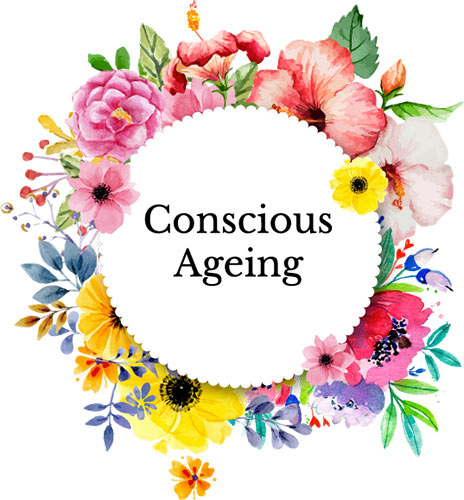
CONSCIOUS AGEING
SEASON 6 EPISODE 5
October 9th 2019
BLOG und INFO SEITE
Stirb und Werde – Der Zyklus des Lebens mit Theresia-Maria Wuttke und Ute Weber
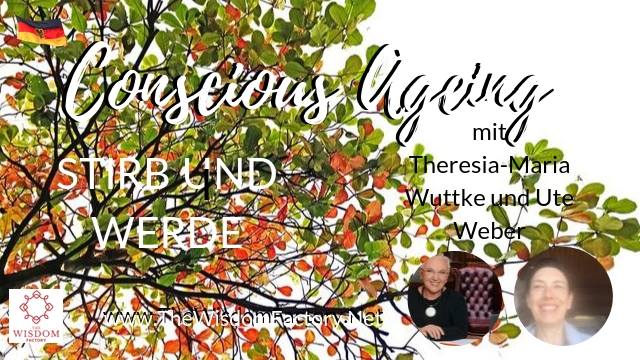
Das bekannte Sprichwort und Titel eines Buches von Andre Gide wird hier mit Leben erfüllt von der Wachstumsgeschichte unseres Gastes Theresia-Maria Wuttke. Konfrontiert mit lebensbedrohenden Krankheiten von Kindesbeinen an konnte sie erleben, wie die unmittelbare Gefahr des Sterbens in wiedergewonnenes Leben führt. Ein schwerer, aber einsichtsreicher Entwicklungsweg.
“Tod und Wiedergeburt! ist eine spirituelle Weisheit. Im Alltagsleben erfahren wir immer wieder den Tod im Kleinen, Verlust von Dingen, an denen wir hängen, oder schwerwiegender von geliebten Menschen. Wie werden wir damit fertig? Wir können daran verzweifeln, aber hier liegt auch das Potential zum Wachsen und Reifen als Mensch, in diesem unsrem Leben. Loslassen Lernen als Vorbereitung auf den Moment, wo wir alles, was uns bisher ausmachte, loslassen müssen. Wenn wir eine positive Sichtweise und Erlebensweise entwickeln, wo wir das, was nach diesen Toden neu entstehen kann, mit Neugier annehmen und wertschätzen, dann haben wir die Chance, ein erfülltes Leben zu leben.
Der Zyklus des Lebens, .oder die vielen Zyklen im Leben, zu umarmen anstatt ängstlich zu versuchen, sich vor Veränderung zu schützen, ist der Schlüssel, der zur Fülle führt. Angst verengt uns und macht uns unfähig, das Leben, so wie es ist, anzunehmen und zu genießen. Loslassen lernen führt uns in den Flow, aus dem heraus vieles möglich wird, was man vorher nie als Möglichkeit auch nur gesehen hätte. Es erlaubt uns, das Leben wertzuschätzen und als Geschenk anzunehmen, mit allem, was sich darin entfalten will.
Warum lernen wir nicht, das Leben wertzuschätzen, das Positive zu erkennen und zu pflegen? Warum sorgen wir uns um jede Kleinigkeit, haben Angst, wo sie nicht berechtigt ist – also fast immer und gegenüber fast Allem – und leben in Ablehnung und ätzender Kritik, Im Privaten und in unserer Gesellschaft? Wie könnten Kinder so geführt werden, dass diese Ängste nicht entstehen? Wie könnte Tod wieder zu einem ganz normalen Ereignis im menschlichen Leben werden und aus der tiefen Tabugrube herauskrabbeln? Theresia gibt uns ein wunderbares Beispiel von ihren Enkelkindern.
Wertschätzen durch Achtsamkeit: das Thema unsres anderen Gastes Ute Weber: Achtsamkeit gegenüber sich selbst, den anderen und der Welt gegenüber. Was ich achtsam betrachte und womit ich mich vertraut mache, das muss nicht sofort in den Schatten verschoben werden, was aber automatisch geschieht, wenn man sich in Angst und Sorge bestimmten Themen zuwendet und versucht, sie so gut wie irgend möglich zu vermeiden.
Es sind die Schatten, die unsere Beziehungen zerstören und zu Krieg führen, im Persönlichen wie auch im Globalen. Den Schatten aufdecken und integrieren sollte das oberste Lebensziel aller Menschen sein, aber wir sind weit davon entfernt, trotz Bemühungen von Psychologen, aufgeschlossenen Ärzten und bekannten Lehrern wie Dr. Rüdiger Dahlke oder Ken Wilber. Wir hören ihnen zu, sind inspiriert applaudieren – und tun meist nichts.
Darum ist es immer wieder eine Freude, mit Menschen zu sprechen, die ernsthaft ihren Wachstumsweg gehen, die schon weit gekommen sind und gerne ihre Erfahrung teilen und andere inspirieren, der Realität mit freundlichem Blick ins Auge zu schauen. Wie würde unsere Welt aussehen, wenn Achtsamkeit, Meditation und ähnliche Praktiken schon in der Schule gelehrt würden? Wenn wir von klein auf lernen würden, was die Gesetze des Lebens sind, des wirklichen Lebens, und nicht die des Funktionierens in unserer verkrusteten Gesellschaft und erbarmungslosen Wirtschaft? Kaum auszudenken!
Da stellt sich immer wieder die Frage: Sind wir bereit, die nötige Arbeit zu leisten für ein gutes und erfülltes Leben, in dem gleichen Maß wie wir Energie ins Geldverdienen und Karriereleiterklettern verwenden? Wenn wir von Menschen umgeben sind, die diese andren Werte verkörpern, dann kann es gelingen. Man braucht das notwendig, wenn man nicht die Energie von jenen Pionieren hat, die trotz Ächtung und Behinderungen jeglicher Art unbeirrt ihren Weg gehen, ihren inneren Werten folgend. Jesus musste sterben für seine Botschaft der Liebe, Menschen werde für verrückt eingestuft, wenn sie Liebe predigen und verkörpern, anstatt Hass, dann wenn sie anders leben wollen, im EInklang mit der Natur, dem Leben und ihren hohen inneren Werten.
Auch heute sind solche andere Menschen noch in der absoluten Minderzahl, aber heute kann man schon öffentlich über diese Themen reden, ohne als Hexen verbrannt oder oder als geisteskrank eingesperrt zu werden. Heute, im Zeitalter der Kommunikationstechnik, können wir uns finden und uns gegenseitig halten und ermutigen!
Ich wünsche Euch viel Freude und Inspiration beim Verfolgen meines Gespräches mit Theresia-Maria Wuttke und Ute Weber.
Im ONLINE SALON des”Integrales Forum”
1:25 Ute Weber stellt sich vor. Der Integrale Salon Wien
2:23 Theresia über “Stirb und werde” in der eigenen Biografie: das Leben entfalten trotz der Bedrohlichkeit des Todes und unsterblich sein.
3:50 Kurse über Lebensprozesse und Tod von frühem Erwachsenenalter. Hospizbewegung, Arbeit mit Krebserkrankten Frauen und Sterbebegleitung: Verwandlung der Todesdrohung in Leben.
5:15 Heidi’s Bezug zu Tod: persönliche Erfahrung, auch Gespräche hier in der Wisdom Factory.
7:15 Theresia: Verlust ihres Lebenspartners: durch alle Stationen zusammen gegangen. Ein großes Mysterium. Halten und Loslassen, Vollendung von etwas Unaussprechlichem, was noch immer nährt.
9:02 Heidi: Eine Gnade, den Tod zu bezeugen und dem Menschen folgen und unterstützen.
10:05 Theresia: Hingabe mit der Tiefe des Atems verbunden. Im Einklang sein. Den Kreislauf erkennen, ein Geschenk und eine Gnade.
11:03 Ute: Krebsdiagnose vor 9 Jahren. Kübler-Ross Sterbephasen kann sie jetzt sehen, als es um Loslassen geht. VIsualisierung des Sterbeprozesses in Therapie. Die kleinen Abschiede im Alltag: was bedeutet, von etwas loslassen, was mir ans Herz gewachsen ist. Im wahren Leben ankommen.
14:35 Heidi: sich von Dingen verabschieden, wegwerfen. Ein Prozess, aufgeben und in die Realität kommen. Beim Tod dabei sein, die Erfahrung machen können
17:17 Theresia: Sie hat gelernt, in jedem Moment da zu sein, sich der inneren Führung anzuvertrauen. Was nicht sein soll, wird gehen. Der Spur folgen und im Flow sein. Loslassen ist jetzt ein Prozess
1845: Ute: Präsenz und Anwesenheit. In der Bewusstheit stehen hilft, das Leben zu bewältigen. Im Flow ist alles möglich und natürlich,
20:00 Heidi: 2 innere Ebenen. Die eine gelassen, die andre besorgt und ängstlich. Welche ist besser für uns`Lernen. In solchen kritischen Situationen ist man wach in andrer Weise.
22:00 Theresia: Sie kennt das Beschriebene. Dann hat sie das Potential, loszulassen, viel stärker aktiviert. Ohne Gedanken der Einordnung, dem schöpferischen Prozess sich anvertrauen. Praktisch den eignen Tod in großer Freude vorbereiten.
24:40 “Before I go solution” Gesprächspartner in unsren Shows
25:57 Das kleine Sterben>: neue Möglichkeiten entstehen. Kann ich den Transformationsprozess bewusst miterleben? Hinschauen, was sich da zeigen mag, etwas Neues, was ich gar nicht denken kann.
27:48 Theresia: die Geschichte ihrer Enkeltochter: der Verlust der Zähne. Ein Sterbeprozess, aus dem etwas Neues entsteht. Es kommt auf unsre Haltung im Leben an. Vorbeitung darauf, ein Schulkind zu sein.
30:25 Heidi: Warum können wir in unsrer Gesellschaft nicht mit Verlust umgehen und ihn auch positiv sehen. Was können wir zur Veränderung tun?
31:35 Theresia hat gelernt aus Erfahrung: wenn wir etwas zur Reife gebracht haben, dann können wir auch gehen. In guten Beziehungen ist der letzte Schritt leichter. Sterben hat mit Beziehungen zu tun, im Leben und im Sterben. Zu Großelternzeiten war der Tod zu Hause und die Begleitung durch die Familie normal. Die Geschichte ihrer Kinder anläßlich des Todes des Großvaters.
35:18 Heidi: Heute ist unsre Beziehungsfähigkeit gestört. Kein intergenerationszusammenleben.
36:18 Ute: Wir müssen bei uns selbst beginnen. Grundsätzlicher als Beziehung ist für sie die Achtsamkeit: Was bedeutet Leben? Ein tieferes Verständnis kultivieren. “Achtsamkeit” ist populär zur Zeit und wichtig. Integration der Veränderung.
38:12 Theresia: Sie bietet selbst Kurse zu Meditationen an. Der Beginn der Entwicklung. Bezug zu Achtsamkeit geht oft früh verloren durch die Medien In Beziehung zu uns selbst und zu den andren treten. Uns im KÖRPER wahrnehmen, der das Instrument ist. Nur mentale Ebene ist körperlos, das Leben findet aber HIER statt, wozu man den Körper braucht. Akzeptanz des sterbens schwierig, wenn ich nur im Mentalen lebe mit der Illusion der Unsterblichkeit. Der Körper ist wichtig, bewusst zu werden.
41:33 Heidi: Singen als Weg zu Körperbewusstheit. Afrikaner gehen ganz anders mit dem Körper um!
44:05 Ute: Lebensfreude im Tanz, sich bewegen lassen, das Leben feiern und zu genießen, körperlich und bewusst.
44:49 Theresia: Leben ist Bewegung und Freude. Geschichte von ihren Enkelkindern: “Ich esse jetzt langsam!” und tat, was sie spürt, was jetzt wesentlich ist. Die Wichtigkeit, Kinder so zu fördern, körperlich-seelische Bindung zum Vollzug der Einheit. Gemeinsames Tun, sich bewegen, berühren, ist gemeinschaftsstiftend und führt zurück zu uns selbst. Vom ICH zum DU zum WIR.
48:00 Beginn der Ernte.
48:40 Ute: Die Themen im gemeinsamen Raum, wichtige Aspekte zu erfülltem Leben, wo Tod normal ist. Wie können wir einen Beitrag leisten, es von klein auf zu leben.
50:35 Theresia: Genährt vom Austausch der Erfahrungen und Gedanken. Einfach sein, im Augenblick, Denken anwenden, nur beim reflektieren Betrachten wollen, sonst einfach da sein.
52:20 Heidi: Lernkurve: es gibt Dinge, die ich früher als Blödsinn bezeichnet hätten. Sensibilität für magisches Bewusstsein wieder entwickeln.
54:05 Theresia: das Geschenk des persönlichen Beitrags und Erlebens mit der anderen Dimension. Die Kirschblüten im November.
55:55 Heidi: die Geschichte der Kraniche. Das andre zulassen können als mögliche Realität.
Über Theresia- Maria Wuttke
Eine ausführliche Beschreibung findest Du HIER
Über Ute Weber-Woisetschläger
Ute ist auf der Suche nach dem Schönen, Wahren und Guten im Leben und in der Kunst. Sie schreibt:
Ich verstehe mich als Philosophin, Kunsthistorikerin, Kommunikatorin (Mag. phil., MSc) und Integrale Lebensbegleiterin (u.a. Integraler Entwicklungslehrgang, Integraler Business Coach bei Matthias Florian sowie div. Weiterbildungen im Bereich der Persönlichkeitsentwicklung, Achtsamkeits- und Dialogpraxis, regelmäßige Meditationspraxis und Higher-We-Kultivierung).
Nach leitenden Funktionen im Bereich der Presse- und Öffentlichkeitsarbeit in verschiedenen Museen suche ich nach einer existentiellen Erkrankung die Nähe zu Menschen, die sich vom integralen Ansatz angesprochen fühlen und sich persönlich, in ihrem In-der-Welt-Sein und in ihren Beziehungen achtsam und bewusst weiter entwickeln möchten.
Am Integralen Zentrum öffnen wir insbesondere den Raum für Selbsterfahrung und das Gewahren von Selbstverantwortung: In der Integralen Meditation kontemplieren wir Entwicklungsstufen und –zustände, im Integral Art Lab erfahren wir tiefere Dimensionen unseres Seins und im Integralen Salon beleuchten wir individuelle und kollektive Themen aus verschiedenen Perspektiven.
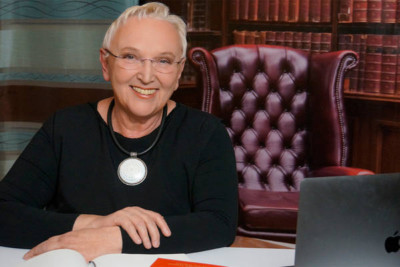
Theresia-Maria Wuttke
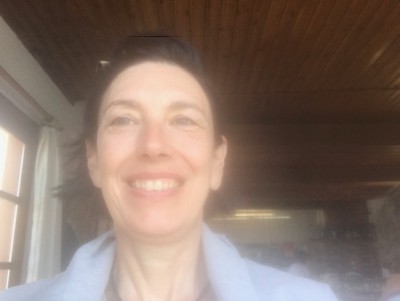
Ute Weber
RESOURCEN









Leave A Comment